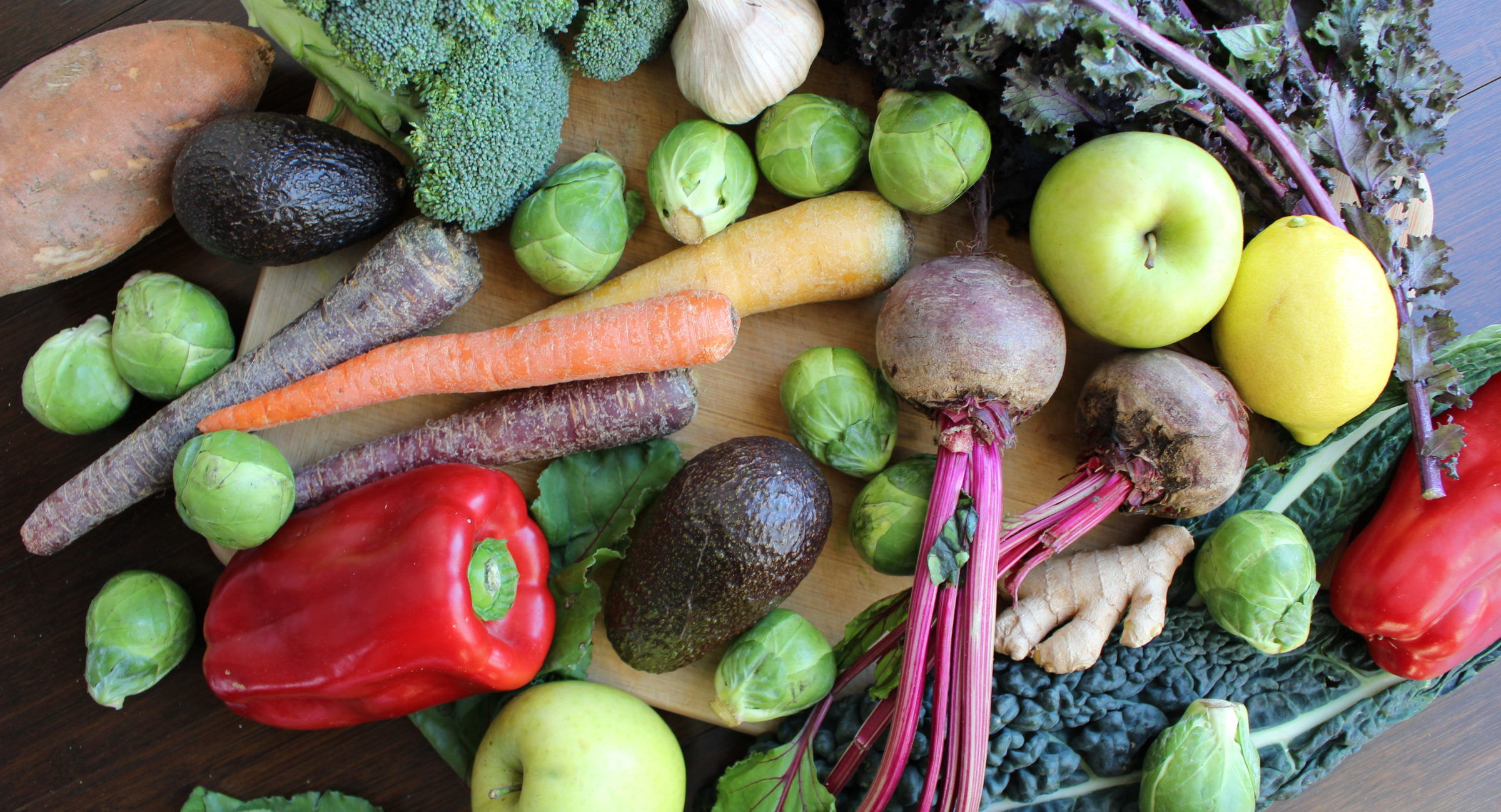Digestion Part 1: What is Your Body Trying to Tell You?

March 29, 2017
Quick note: I’ve made a Digestion Cheatsheet with the exact 6 tools I use with clients to help improve gut health. Best part, it’s totally free and super simple! Grab your copy here.
Most of us eat multiple times per day, and how we digest our food is one of the clearest signs our body communicates to us about our gut health. Often we overlook some of the indications we are given that something might be a bit off, or perhaps some of the feelings we experience happen so regularly that we no longer notice that anything feels unusual, because it has become our new “normal.”
Our gastrointestinal tract is referred to as the second brain with good reason. There are millions of neurons embedded in the walls of our gut, and they are part of what’s called enteric our nervous system. This is where those sayings come from about “going with your gut” or “trusting your gut” and that feeling of butterflies in your stomach can be identified as an actual physiological response to stress. 70% of our immune system resides in the gut, and as much as 80 – 90% of the neurotransmitter serotonin is produced in the gut as well, which affects our mood, appetite, digestion, memory and sleep.
The act of digestion itself refers to how our bodies break down foods and absorb nutrients. Digestion begins in the mouth as enzymes in saliva begin to break down the food you are eating as you chew. After you swallow, the hydrochloric acid in the stomach begins to churn the food about in the stomach to break it down further before move through to the rest of the digestive tract. Unfortunately many of us are rushed and don’t take the time to fully chew, and due to the diet of processed foods that many of us consume, our hydrochloric acid is often not as strong as it would be ideally and this can contribute to digestion difficulties.
Because the gut plays an enormous role in our mental and physical well-being, poor digestion is often at the root of many issues you might not expect.
So how do you know if you have poor digestion? Here are some signs you might notice:
- Bloated, gassy regularly
- Uncomfortable or lethargic after meals
- Heartburn/acid reflux
- Weight gain
- Nutrient deficiencies (more of us have them than you might think)
- Undigested food in stool
- Pooping: type, quality, regularity
Digestion Part 2 covers everything your poop is trying to tell you. Your poop is one of the most easily distinguishable ways your body has of speaking to you about your digestive health, and we are going to talk all about the different types of poop, what they mean and how to improve your poop.
Many physical and cognitive problems can indicate an issue in the gut, including:
- Weight management issues
- Skin conditions
- Asthma
- Allergies
- Migraines
- Autoimmune Disease
- Arthritis and joint inflammation
- Diabetes and difficulty regulating blood sugar
- Mood Swings
- Depression, anxiety and other mental health disorders
How can we repair digestion?
These are some things that should be avoided to optimize digestion:
1. Eliminate foods that can be irritating
Other than any food allergies you may have that have already been identified, removing the most common allergens can often be helpful. These allergens can include milk, eggs, peanuts, tree nuts, shellfish, soy, and wheat for some people. Your body may not have issues with any of these foods, but it can be a good starting point for some. For other individuals, there may be completely different foods that may be creating sensitivities or intolerances. It’s very specific to each person, which is why working with a professional who can guide you through an elimination diet or help zero in on specific foods or lifestyle choices that can be negatively impacting your digestion can be the most helpful.
2. Overeating
Overeating healthy foods will stress the digestive system (and cause weight gain) as easily as overeating junk foods. Learning to eat more mindfully and taking deep breaths before sitting down to a meal can help to ensure that you eat a correct portion size and feel energized after your meal, not lethargic and uncomfortable like we all feel when we overeat. Rarely do I ever hear anyone comment on how happy they are that they ate too much food. Before going back for seconds, give yourself 20 minutes for the food you consumed to decide if you are still hungry. Often you may find that you’re already more full than you realized.
3. Chewing gum
The chewing motion that must take place when using gum stimulates the digestive juices and readies the body for digestion but no food follows. We also swallow more air when gum is being chewed and this can lead to passing gas much more frequently. Additionally, sugar free gum contains artificial sweeteners that can also have a mild laxative effect as well. Overall, not the most pleasant side effects.
4. Antacids
The main purpose of antacids is to relieve heartburn by neutralizing stomach acid. Hydrochloric acid, the acid in our stomachs, not only breaks down food but also kills off bacteria that we don’t want in our bodies, especially not passing into the rest of our digestive tract. Since many of us already may have lower than ideal stomach acidity, there can be bacterial overgrowth that occurs and causes gas. The pressure from the gas can cause a malfunction of the sphincter keeping the food in your stomach from coming back up your esophagus and if this malfunctions, stomach acid can come back up the esophagus leading to symptoms of heartburn.
Neutralizing remaining stomach acid may make you feel better, at least temporarily, but our stomach acid is a key part of digestion and we need it to properly break down foods, absorb nutrients and kill off bacteria that we don’t want in our system. If you’re suffering from heartburn, there are likely more significant underlying issues that can be addressed with greater success than using antacids.

What kinds of steps can we take to improve digestion and add to our lives or diets to support our guts?
1. Hydrate
Our bodies require fluids to keep things moving through the digestive tract. If you choose to drink alcohol or caffeine, be sure to hydrate even more thoroughly since both pull water from the body. While we know how important it is to drink tons of water, timing how you hydrate appropriately can make a difference. I usually recommend drinking at least a couple full glasses of water first upon waking in the mornings to rehydrate the body after sleeping.
As for when to drink water the rest of the day, as long as you are hydrating regularly that is by far the most important part. If you want to take it one step further for optimal digestion, there is some thought that liquids dilute the stomach acid that is necessary to break down the food we eat. While most scientific evidence doesn’t seem to support this theory, in my personal experience I digest my food much better when I hydrate on an empty (or close to it) stomach. Otherwise I find it can make me a bit bloated and uncomfortable, but everyone is a little different.
2. Manage Stress
There is always going to be stress, so we need to move away from the mindset of “things will slow down right after this work project is done, after this course is finished, after we go on vacation,” or a number of other reasons we give ourselves to delay managing our stress.
Stress can be immensely helpful to us. It pushes us to accomplish what we need to get done, builds muscle, grows resilience and makes us better, stronger, more amazing human beings. Stress can also overwhelm us and we can allow it to take over our lives and be the guiding force behind our decision making. It can have a massively overwhelming negative impact on us emotionally, mentally and physically if we don’t manage it in a way to benefit us.
Additionally, eating when feeling stressed will negatively effect digestion. Take time to sit down and eat slowly and mindfully, preferably without any electronic devices present. Take a couple of deep breaths before consuming a meal, and chew food thoroughly, as the first step of digestion begins in the mouth and chewing food down to almost a liquid form can have an incredibly positive impact on the way you digest what you are eating.
3. Probiotics
Probiotics are one of the rare supplements that can be a good choice for almost anyone. They can help to restore the healthy gut bacteria that works hard to break down the food you are eating and aids nutrient absorption. Diversity of the bacteria in your gut is being shown through research to create a healthier digestive tract, so when you are shopping for probiotics, look for ones that have as many different strains as possible. While drugs like antibiotics are often necessary, the downside is that they wipe out the good bacteria from the gut along with the bad. Take antibiotics as directed by your doctor when they are needed, maybe just follow them up with some extra probiotics to help restore the good guys ; )
4. Bitter foods
Bitter foods stimulate the digestion, and can be a welcome relief to our bodies who have become used to a heavy focus on salty and sweet flavours. The even better news? Dark chocolate (70% or higher cacao) and cacao nibs qualify as bitter foods. You can also try bitter greens like dandelion, chicory or arugula mixed into your salads or stir-fries, and it can make a beautiful complement to your meals.
5. Collagen
Collagen is rich in amino acid glutamine, which can help to strengthen the lining of the gut along with a bonus of working wonders for your hair, skin and nails. Look for a high quality collagen powder from grass-fed cows that can be mixed into smoothies, soups, oatmeal or coffee/tea. I’ve even mixed it into pancake batter and baked goods and it doesn’t seem to shift the ratio of dry to wet ingredients at all, while simultaneously upping the protein content a little bit and supporting gut health. There are different kinds on the market now, but you want to look for one that doesn’t coagulate like Jello. I’ve been enjoying this one, and I heard earlier this week about a different company that has just released a vegetarian collagen option that I’m interested to try. I’ll let you know what I think when I’ve had a chance to try it.
This list as a whole can seem overwhelming, but these are not changes that need to be done all at once. Taking baby steps and shifting how you consume food one small change at a time can begin to make an enormous difference in your health and you can see such positive changes. If you have any questions, don’t hesitate to reach out!
Grab your FREE Digestion Cheatsheet here.
Disclaimer: I will only ever post about I am not affiliated with any products or companies mentioned in this post. However, I do receive a small kickback from Amazon if you choose to purchase products through the link above. For more info please see more under Terms & Conditions. .
WHERE DO WE BEGIN?
This is where it all starts. Your FREE foundational guide to understanding yourself in whole new ways that will re-frame and completely shift how you approach relationships.
SEND ME THE GOODS
READY TO WORK TOGETHER?
Step into your strength. Reclaim your power. Allow yourself to be truly seen.